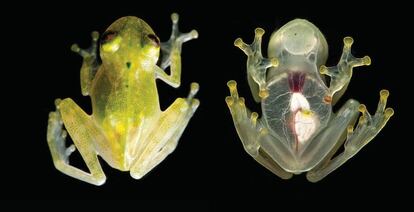The Ecuadoran glassfrog whose heart can be seen beating
New species is already under threat from oil exploration in Amazon, warn scientists
Ecuadoran and US researchers have discovered a new species of glassfrog in the Amazon jungle. The amphibian, which has been named Hyalinobatrachium yaku, differs from other glassfrogs due to the dark green spots it has on its head and body, as well as having a longer and louder song and transparent skin, through which its heart can be seen beating.

In a study published in the US scientific journal ZooKeys, researchers at Ecuador’s Quito University explain that the ventral pleats of the Hyalinobatrachium species are transparent, meaning that its organs are visible, but not all glassfrogs have hearts that can be seen through their chests. In some, the organ appears white, but in the yaku the blood can be seen as red.
Another peculiarity of the amphibian is its reproductive behavior: males look after the eggs until they hatch and fall into running water. The researchers warn that the newly discovered species is already at risk of extinction due to oil exploration and production in the area. “Water, in the form of streams, is fundamental for the reproductive biology of all glassfrogs. Water pollution, mainly through oil and mining activities, represents one of the biggest threats for Amazonian amphibians, as well as for numerous other water-dependent species,” they write in the ZooKeys article.
Water pollution represents one of the biggest threats for Amazonian amphibians
Road-building is also a threat to the frogs. The research team says that a road close to the area of San José de Payamino, around 100 kilometers west of Quito, close to the Sumaco Galeras National Park, has impacted on H.yaku populations, noting that no communities were found within a kilometer of the highway.
“Glassfrogs presumably require continuous tracts of forest to interact with nearby populations, and roads potentially act as barriers to dispersal for transient individuals, such as those documented at San José de Payamino,” notes the article in ZooKeys, which concludes with a call to the Ecuadoran authorities to take measures to protect the habitat the species lives in.
English version by Nick Lyne.
Tu suscripción se está usando en otro dispositivo
¿Quieres añadir otro usuario a tu suscripción?
Si continúas leyendo en este dispositivo, no se podrá leer en el otro.
FlechaTu suscripción se está usando en otro dispositivo y solo puedes acceder a EL PAÍS desde un dispositivo a la vez.
Si quieres compartir tu cuenta, cambia tu suscripción a la modalidad Premium, así podrás añadir otro usuario. Cada uno accederá con su propia cuenta de email, lo que os permitirá personalizar vuestra experiencia en EL PAÍS.
¿Tienes una suscripción de empresa? Accede aquí para contratar más cuentas.
En el caso de no saber quién está usando tu cuenta, te recomendamos cambiar tu contraseña aquí.
Si decides continuar compartiendo tu cuenta, este mensaje se mostrará en tu dispositivo y en el de la otra persona que está usando tu cuenta de forma indefinida, afectando a tu experiencia de lectura. Puedes consultar aquí los términos y condiciones de la suscripción digital.








































